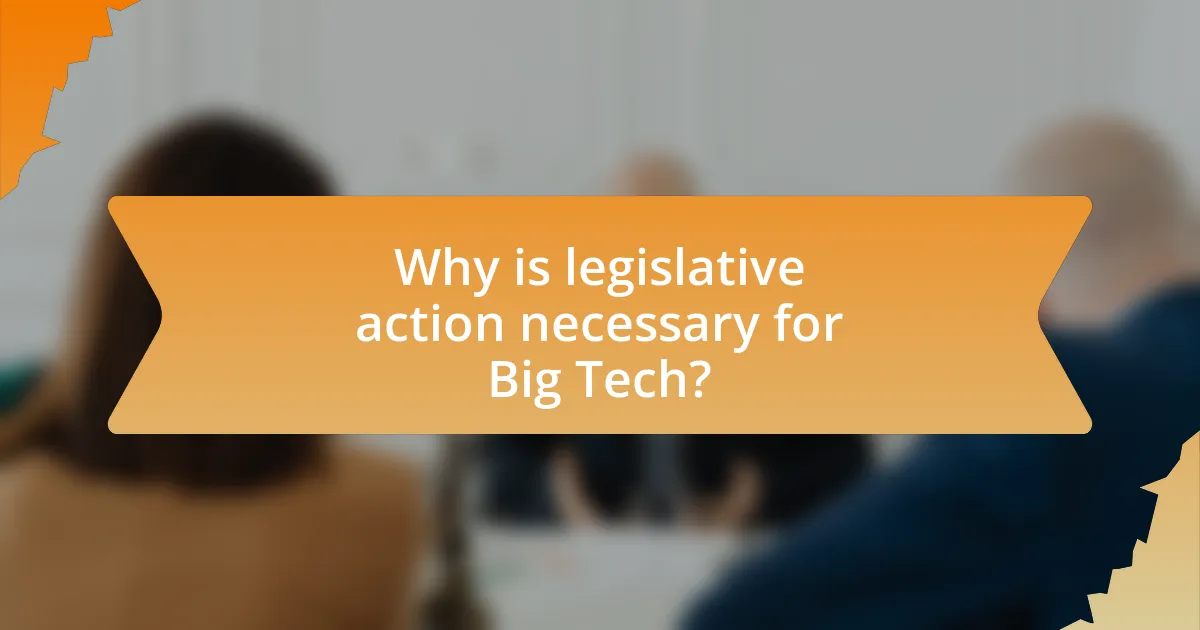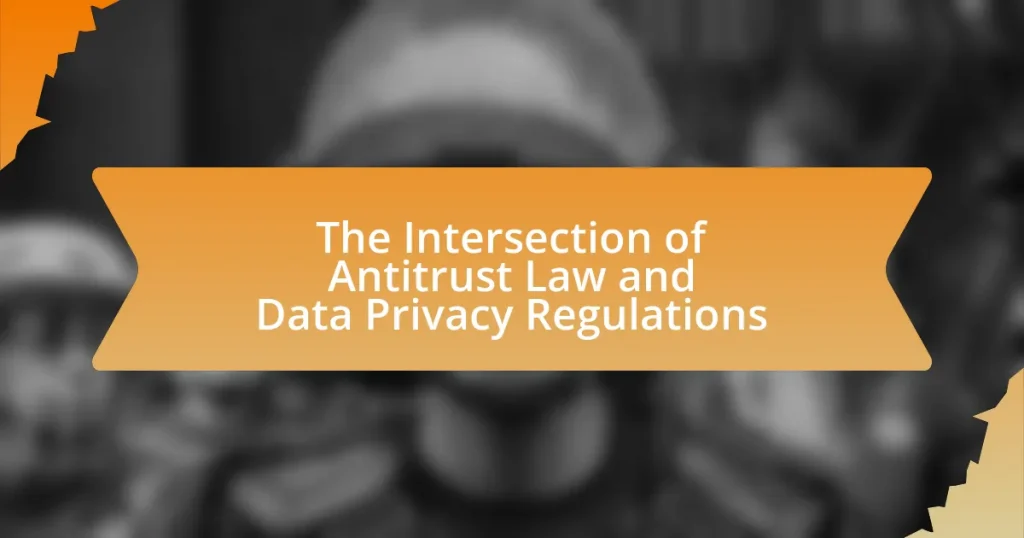The article focuses on upcoming legislative proposals aimed at regulating Big Tech, specifically highlighting the American Innovation and Choice Online Act and the Open App Markets Act. These proposals seek to address monopolistic practices, enhance data privacy protections, and promote competition within the tech industry. Key issues discussed include the implications of these regulations for consumer privacy, the potential impacts on competition, and the challenges faced by current regulatory frameworks in keeping pace with technological advancements. The article also examines the arguments for and against increased regulation, the expected changes in Big Tech’s business practices, and the implications for consumers and stakeholders in the legislative process.

What are the upcoming legislative proposals affecting Big Tech?
Upcoming legislative proposals affecting Big Tech include the American Innovation and Choice Online Act, which aims to prevent large tech companies from favoring their own products over competitors, and the Open App Markets Act, designed to promote competition in app stores by prohibiting anti-competitive practices. These proposals are part of a broader effort by lawmakers to regulate the influence and market power of major technology firms, addressing concerns over monopolistic behavior and consumer protection. The urgency for these legislative measures has been underscored by increasing public scrutiny and bipartisan support for reforming how Big Tech operates.
How do these proposals aim to regulate Big Tech companies?
These proposals aim to regulate Big Tech companies by implementing stricter antitrust laws, enhancing data privacy protections, and increasing transparency in algorithms. Stricter antitrust laws are designed to prevent monopolistic practices, ensuring fair competition; for instance, the proposed legislation includes measures to prohibit mergers that would significantly reduce competition. Enhanced data privacy protections focus on safeguarding user information, requiring companies to obtain explicit consent before data collection, as seen in the General Data Protection Regulation (GDPR) in Europe. Increased transparency mandates that companies disclose how their algorithms operate, allowing users to understand content curation and advertising practices, which addresses concerns about misinformation and bias.
What specific practices are targeted by these legislative measures?
The specific practices targeted by these legislative measures include data privacy violations, anti-competitive behavior, and misinformation dissemination. These measures aim to hold tech companies accountable for mishandling user data, engaging in monopolistic practices that stifle competition, and spreading false information that can harm public discourse. For instance, legislation like the California Consumer Privacy Act (CCPA) directly addresses data privacy by imposing strict regulations on how companies collect and use personal information. Additionally, proposed antitrust laws seek to dismantle monopolistic structures by preventing large tech firms from acquiring smaller competitors, thereby promoting a more competitive marketplace.
How do these proposals address consumer privacy concerns?
The proposals address consumer privacy concerns by implementing stricter regulations on data collection and usage by technology companies. These regulations mandate transparency in how consumer data is collected, stored, and shared, ensuring that consumers are informed about their data rights. For instance, the proposals often include requirements for companies to obtain explicit consent from users before collecting personal information, thereby empowering consumers to control their data. Additionally, they may impose penalties for non-compliance, which serves as a deterrent against potential privacy violations. This approach is supported by growing public demand for enhanced privacy protections, as evidenced by surveys indicating that a significant majority of consumers are concerned about their online privacy and data security.
What are the potential impacts of these proposals on competition?
The potential impacts of these proposals on competition include increased market accessibility for smaller firms and reduced monopolistic practices by large tech companies. By implementing regulations that promote transparency and fairness, these proposals aim to level the playing field, allowing new entrants to compete more effectively. For instance, the European Union’s Digital Markets Act seeks to prevent dominant platforms from engaging in anti-competitive behavior, which can stifle innovation and limit consumer choice. Historical data shows that when similar regulations were enacted in other sectors, such as telecommunications, competition increased, leading to lower prices and improved services for consumers.
How might these regulations affect smaller tech companies?
These regulations may impose significant compliance costs on smaller tech companies, potentially hindering their growth and innovation. Smaller firms often lack the resources to navigate complex regulatory frameworks, which can lead to increased operational burdens. For instance, a study by the Brookings Institution found that regulatory compliance can disproportionately affect smaller businesses, as they spend a higher percentage of their revenue on compliance compared to larger firms. This financial strain may limit their ability to invest in research and development, ultimately stifling competition in the tech industry.
What role do antitrust laws play in these legislative efforts?
Antitrust laws serve as a critical framework in legislative efforts aimed at regulating Big Tech by promoting competition and preventing monopolistic practices. These laws empower regulators to scrutinize mergers and acquisitions that could reduce market competition, ensuring that no single entity can dominate the market to the detriment of consumers and innovation. For instance, the Sherman Act and the Clayton Act provide the legal basis for challenging anti-competitive behavior, which has been increasingly relevant as major tech companies expand their influence. Recent legislative proposals, such as the American Innovation and Choice Online Act, explicitly reference antitrust principles to address concerns about platform dominance and unfair practices, highlighting the ongoing relevance of these laws in shaping the future landscape of technology regulation.

Why is legislative action necessary for Big Tech?
Legislative action is necessary for Big Tech to ensure accountability and protect consumer rights. As major technology companies dominate markets, they often engage in practices that can stifle competition, invade privacy, and manipulate user data. For instance, the European Union’s General Data Protection Regulation (GDPR) was enacted to address privacy concerns and impose strict guidelines on data handling, demonstrating the need for regulatory frameworks to safeguard individuals. Additionally, antitrust investigations into companies like Google and Facebook highlight the necessity of legislative measures to prevent monopolistic behaviors that can harm innovation and consumer choice.
What challenges do current regulations face in addressing Big Tech’s influence?
Current regulations face significant challenges in effectively addressing Big Tech’s influence due to their rapid technological advancements and the global nature of their operations. These companies often operate across multiple jurisdictions, complicating enforcement and compliance with varying national laws. For instance, the European Union’s General Data Protection Regulation (GDPR) has set a precedent, but enforcement against companies based in the U.S. remains difficult, as seen in cases where fines are imposed but compliance is inconsistent. Additionally, the pace of innovation in areas like artificial intelligence and data analytics outstrips the ability of regulators to create relevant and timely legislation, leading to gaps in oversight. Furthermore, the lobbying power of Big Tech firms can hinder regulatory efforts, as they invest heavily in influencing policy decisions, which can result in regulations that are less stringent than necessary.
How has Big Tech’s growth outpaced existing regulatory frameworks?
Big Tech’s growth has outpaced existing regulatory frameworks due to rapid technological advancements and market dominance that have evolved faster than legislation can adapt. Companies like Amazon, Google, and Facebook have expanded their services and user bases significantly, often leveraging data and algorithms in ways that existing laws do not adequately address. For instance, the European Union’s General Data Protection Regulation (GDPR), implemented in 2018, was a response to privacy concerns but has struggled to keep pace with the complexities of data usage in the digital economy. Additionally, the market capitalization of major tech firms has surged, with Apple reaching a valuation of over $2 trillion, highlighting their economic influence and the inadequacy of current antitrust laws to effectively regulate monopolistic behaviors. This gap between the speed of innovation and the slow legislative process has created challenges in ensuring consumer protection and fair competition.
What examples illustrate the need for updated legislation?
Examples illustrating the need for updated legislation include the rise of data privacy concerns, as evidenced by the Cambridge Analytica scandal, where personal data of millions of Facebook users was harvested without consent, highlighting gaps in existing privacy laws. Additionally, the rapid growth of artificial intelligence technologies necessitates regulatory frameworks to address ethical implications and accountability, as seen in debates surrounding AI-generated content and its potential for misinformation. Furthermore, antitrust issues have emerged with major tech companies like Google and Amazon dominating markets, prompting calls for legislation to promote competition and prevent monopolistic practices. These instances underscore the urgency for legislative updates to protect consumers and ensure fair market practices in the evolving tech landscape.
What are the arguments for and against increased regulation of Big Tech?
Arguments for increased regulation of Big Tech include the need to protect consumer privacy, ensure fair competition, and prevent the spread of misinformation. For instance, the Cambridge Analytica scandal highlighted significant privacy violations, prompting calls for stricter data protection laws. Additionally, monopolistic practices by companies like Google and Facebook have raised concerns about market dominance, leading to proposals for antitrust regulations to foster competition.
Conversely, arguments against increased regulation emphasize the potential stifling of innovation and economic growth. Critics argue that excessive regulation could hinder the ability of tech companies to develop new technologies and services, ultimately harming consumers. Furthermore, some believe that existing laws are sufficient and that regulatory measures could lead to unintended consequences, such as reduced investment in the tech sector.
What benefits do proponents of regulation claim?
Proponents of regulation claim that it enhances consumer protection by ensuring that companies adhere to safety and privacy standards. This is supported by the need for accountability in the tech industry, where data breaches and misuse of personal information have become prevalent. Regulations can also promote fair competition by preventing monopolistic practices, as seen in antitrust cases against major tech firms. Furthermore, regulations can foster innovation by creating a level playing field, encouraging smaller companies to enter the market without being overshadowed by larger entities. These claims are backed by historical instances where regulatory frameworks have successfully mitigated risks and promoted ethical practices within industries.
What concerns do critics of regulation raise?
Critics of regulation raise concerns that excessive regulation stifles innovation and competition within the tech industry. They argue that stringent rules can create barriers to entry for startups, limiting diversity and reducing the overall dynamism of the market. Additionally, critics highlight that regulations may lead to unintended consequences, such as increased costs for consumers and reduced access to services. For instance, a report by the Information Technology and Innovation Foundation indicates that overregulation can hinder technological advancements, ultimately affecting economic growth.

How will these legislative proposals shape the future of Big Tech?
Legislative proposals will significantly shape the future of Big Tech by imposing stricter regulations on data privacy, antitrust practices, and content moderation. These regulations aim to enhance consumer protection and promote fair competition, which could lead to a reduction in the market dominance of major tech companies. For instance, the European Union’s Digital Markets Act seeks to prevent anti-competitive behavior by large platforms, potentially leveling the playing field for smaller companies. Additionally, proposed data privacy laws in the United States, such as the California Consumer Privacy Act, require companies to be more transparent about data usage, thereby increasing accountability. These legislative changes are expected to drive Big Tech companies to adapt their business models, prioritize user privacy, and foster a more competitive environment.
What changes can we expect in Big Tech’s business practices?
Big Tech is expected to adopt more transparent data privacy practices and enhance user consent mechanisms. Legislative proposals, such as the European Union’s Digital Services Act and the proposed American Data Privacy Protection Act, aim to hold companies accountable for data handling and increase consumer rights. These regulations will likely compel Big Tech firms to implement stricter data protection measures, limit targeted advertising, and provide clearer information on data usage, reflecting a shift towards prioritizing user privacy and ethical data management.
How might these proposals influence data handling and user privacy?
These proposals may significantly enhance data handling and user privacy by imposing stricter regulations on how companies collect, store, and share personal information. For instance, legislation like the General Data Protection Regulation (GDPR) in Europe has already set a precedent by requiring explicit consent from users before data collection, thereby empowering individuals with greater control over their personal data. Additionally, proposals advocating for transparency in data practices could mandate companies to disclose their data usage policies clearly, reducing the risk of misuse and fostering trust among users. Such measures are likely to lead to a more secure data environment, as companies will be held accountable for breaches and misuse, ultimately benefiting user privacy.
What new compliance requirements could emerge for Big Tech companies?
New compliance requirements for Big Tech companies could include stricter data privacy regulations, enhanced transparency in algorithms, and increased accountability for content moderation. For instance, the European Union’s Digital Services Act mandates that platforms must take responsibility for harmful content and ensure user safety, which could lead to similar regulations globally. Additionally, the proposed American Data Privacy Protection Act aims to establish a federal standard for data privacy, requiring companies to obtain explicit consent from users before collecting personal data. These emerging regulations reflect a growing trend towards greater oversight of technology firms to protect consumer rights and promote fair competition.
What strategies can Big Tech companies adopt in response to these proposals?
Big Tech companies can adopt proactive lobbying and compliance strategies in response to upcoming legislative proposals. By engaging with policymakers, these companies can influence the legislative process and advocate for favorable regulations. Additionally, they can enhance their compliance frameworks to align with new legal requirements, thereby minimizing potential penalties and fostering trust with regulators. For instance, companies like Google and Facebook have previously invested in compliance teams and legal resources to navigate complex regulations, demonstrating the effectiveness of this approach.
How can companies prepare for potential regulatory changes?
Companies can prepare for potential regulatory changes by establishing a proactive compliance framework that includes continuous monitoring of legislative developments. This involves regularly reviewing industry regulations, engaging with legal experts, and participating in industry associations to stay informed about upcoming proposals. For instance, a survey by the Compliance Week in 2022 indicated that 78% of companies that actively monitored regulatory changes reported better preparedness for compliance issues. By implementing these strategies, companies can effectively mitigate risks associated with regulatory shifts and adapt their operations accordingly.
What best practices should Big Tech follow to align with new legislation?
Big Tech should implement transparency, data privacy, and compliance frameworks to align with new legislation. Transparency involves clear communication about data usage and algorithms, which builds trust and meets regulatory expectations. Data privacy practices must include robust security measures and user consent protocols, as seen in the General Data Protection Regulation (GDPR) in Europe, which mandates strict data handling and user rights. Compliance frameworks should be established to regularly assess and adapt to evolving legal requirements, ensuring that companies can swiftly respond to legislative changes. These practices not only mitigate legal risks but also enhance corporate reputation and consumer confidence.
What are the implications for consumers and users of Big Tech services?
The implications for consumers and users of Big Tech services include increased privacy protections, potential changes in service accessibility, and enhanced competition in the market. Legislative proposals aimed at regulating Big Tech often focus on data privacy, which could lead to stronger safeguards for personal information, as seen in the European Union’s General Data Protection Regulation (GDPR) that has influenced global standards. Additionally, regulations may require Big Tech companies to ensure fairer practices, potentially improving service quality and reducing monopolistic behaviors, thereby benefiting consumers through better choices and prices.
How might consumer rights be enhanced through these legislative changes?
Consumer rights may be enhanced through legislative changes by implementing stricter regulations on data privacy and protection. These regulations can empower consumers by granting them greater control over their personal information, including the right to access, correct, and delete their data. For instance, the General Data Protection Regulation (GDPR) in the European Union has set a precedent by providing consumers with rights that include explicit consent for data processing and the right to be forgotten, which has significantly improved consumer trust and accountability among companies. Such legislative frameworks can lead to increased transparency and accountability in how big tech companies handle consumer data, ultimately strengthening consumer rights in the digital marketplace.
What potential drawbacks could consumers face as a result of new regulations?
Consumers could face increased costs and reduced access to services as a result of new regulations. These regulations often impose compliance costs on companies, which may be passed on to consumers through higher prices. For instance, a study by the Brookings Institution found that regulatory compliance can increase operational costs by up to 20%, leading to higher prices for consumers. Additionally, stricter regulations may limit the availability of certain products or services, as companies may choose to exit markets that become less profitable due to regulatory burdens. This can lead to reduced competition and fewer choices for consumers.
What steps can stakeholders take to engage with the legislative process?
Stakeholders can engage with the legislative process by actively participating in public hearings, submitting comments on proposed legislation, and meeting with lawmakers to discuss their perspectives. Public hearings allow stakeholders to voice their opinions and provide expert testimony, which can influence legislative outcomes. Submitting comments on proposed legislation ensures that stakeholders’ views are formally recorded and considered during the decision-making process. Additionally, direct meetings with lawmakers facilitate personal connections and enable stakeholders to present their concerns and suggestions effectively. These actions are supported by the fact that stakeholder engagement has been shown to enhance the quality of legislation and promote more informed policymaking.



